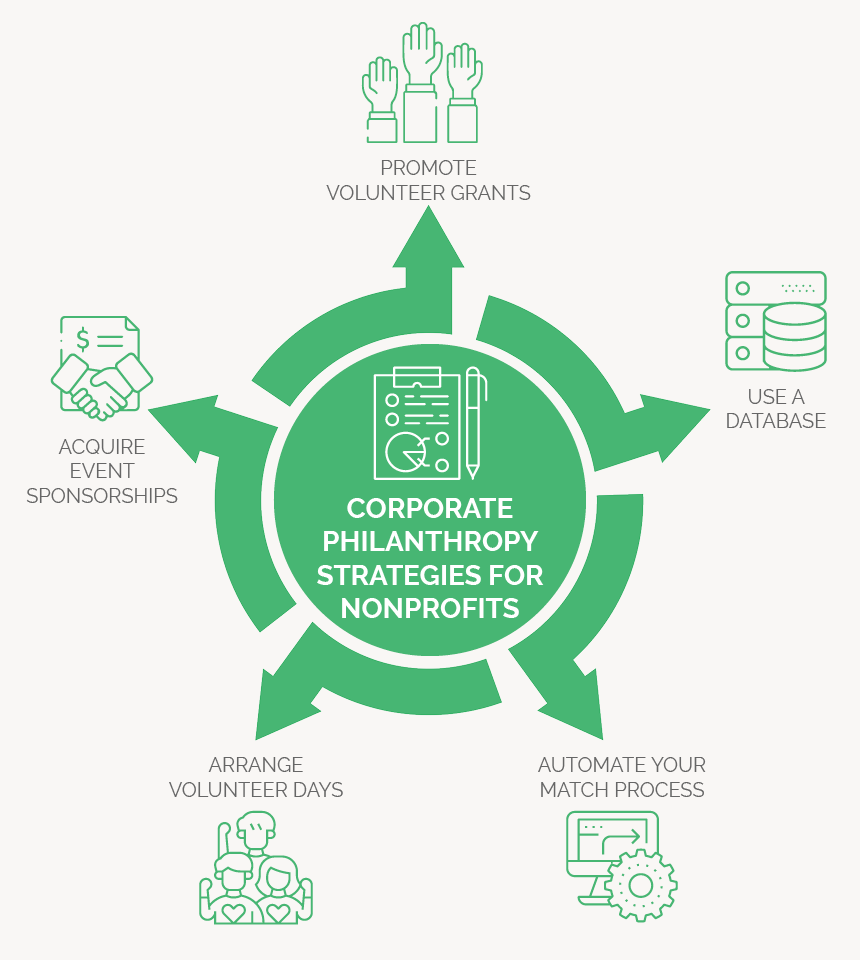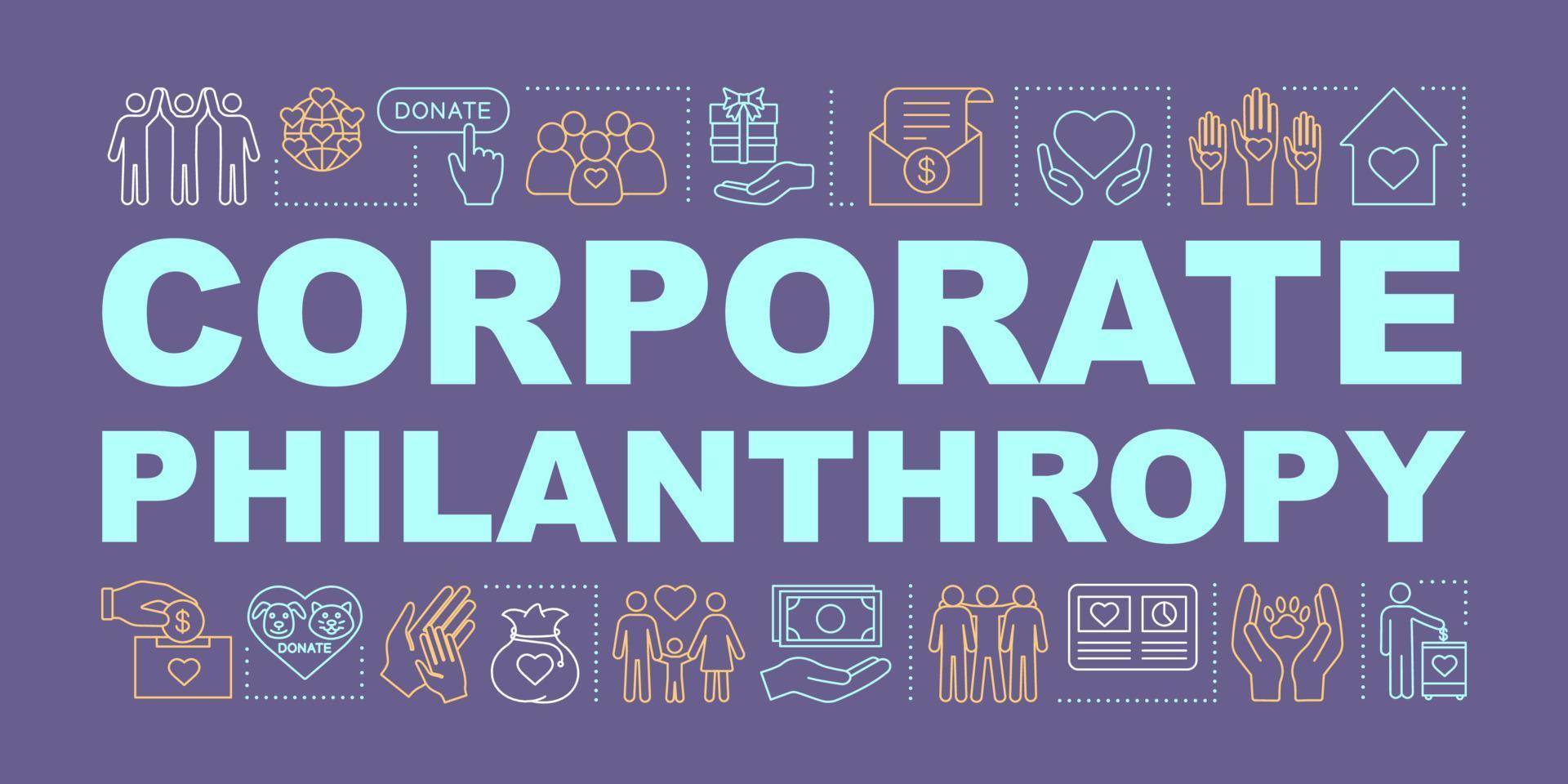Why Business Philanthropy Issues: A Guide to Corporate Social Obligation
Business philanthropy functions as an essential part of corporate social obligation. It mirrors a firm's commitment to societal problems and boosts its public picture. Companies engaging in humanitarian efforts commonly see boosted employee spirits and more powerful neighborhood connections. Nevertheless, real effect of these efforts can be intricate and multifaceted. Comprehending the subtleties of business philanthropy can brighten its importance in today's business landscape. What are the important factors that drive its success?
The Definition of Business Philanthropy
Corporate philanthropy refers to the charitable contributions and initiatives taken on by services to sustain social reasons and neighborhood advancement. This principle includes a variety of activities, including monetary donations, staff member volunteer programs, and in-kind gifts of services or products. Companies participate in philanthropy to address social issues such as education and learning, wellness care, environmental sustainability, and hardship reduction.
Typically, company philanthropy is structured through formal programs or collaborations with nonprofit companies, enabling services to leverage their resources effectively. These initiatives typically intend to make a favorable influence on the community while straightening with the business's values and mission. In addition, business philanthropy shows a commitment to corporate social duty, showcasing exactly how businesses can add to culture beyond revenue generation. By joining humanitarian efforts, companies can play a substantial duty in promoting social change and dealing with area needs.
Advantages of Company Philanthropy for Companies
Participating in corporate philanthropy deals countless benefits for businesses, improving their track record and promoting stronger area ties. Firms that proactively take part in kind initiatives commonly experience enhanced staff member spirits and loyalty. When workers view their organization as socially accountable, they are more probable to feel pleased with their workplace, causing greater degrees of job satisfaction and retention.
Corporate philanthropy can develop valuable networking possibilities. Teaming up with non-profits and neighborhood organizations allows businesses to get in touch with like-minded people and teams, possibly causing collaborations that can profit both parties. Additionally, services took part in philanthropy might discover themselves much more appealing to stakeholders and investors who prioritize ethical practices.
Ultimately, business philanthropy not only sustains societal needs but also provides substantial advantages to businesses, creating a win-win scenario that advertises development and sustainability while adding favorably to the globe.
Enhancing Brand Name Loyalty With Social Obligation
Enhancing brand name commitment via social duty entails structure count on with customers by lining up corporate actions with neighborhood values (corporate philanthropy). Firms can cultivate much deeper connections via area involvement initiatives that resonate with their target market. In addition, genuine brand narration can better reinforce loyalty by showcasing genuine dedication to social reasons
Structure Count On Via Activity
Building depend on through activity is an effective approach that companies can implement to strengthen brand loyalty and foster much deeper links with consumers. When businesses proactively take part in company philanthropy, they demonstrate a dedication to honest practices and social responsibility. This aggressive strategy not only enhances their reputation but additionally reverberates with consumers who focus on values positioning. Openness in philanthropic efforts is essential; companies should efficiently connect their efforts and the influence they are making. Credibility plays a considerable duty as well; customers are more probable to sustain brands that genuinely appreciate social problems instead than those that engage in shallow marketing. Eventually, by prioritizing significant actions over simple words, business can support enduring count on and loyalty among their customer base.
Area Involvement Initiatives

Authentic Brand Narration
Neighborhood engagement campaigns typically work as a structure for genuine brand name narration, which plays a considerable duty in growing brand commitment. By sharing genuine narratives regarding their social obligation efforts, business can link psychologically with customers. These stories highlight the brand name's worths, objective, and dedication to social enhancement, cultivating depend on and relatability. They are much more most likely to create a deeper affinity and preference for it when consumers regard a brand as socially accountable - corporate philanthropy. Authentic narration likewise motivates openness, welcoming customers to engage with the brand on an individual level. Consequently, companies not just improve their credibility yet also construct long-term partnerships with their target market, ultimately bring about raised commitment and advocacy in an open market
The Function of Workers in Business Philanthropy
Workers play a crucial duty fit a company's humanitarian efforts through their involvement and involvement. Efficient worker involvement strategies can boost volunteerism, resulting in significant community impact. As organizations harness the cumulative power and interest of their workforce, they can promote a society of considering that expands beyond the office.
Employee Interaction Methods
Engagement in corporate philanthropy cultivates a feeling of function that prolongs beyond plain profit-making. Companies can boost staff member involvement by executing different techniques that urge engagement in kind initiatives. One efficient strategy is to develop a matching gift program, where the company matches employee donations to qualified charities, magnifying their effect. Furthermore, normal interaction regarding humanitarian efforts can develop understanding and influence employees to contribute their time and resources. Moreover, supplying systems for staff members to share their charitable passions promotes a feeling of ownership and area. Recognizing and rewarding employees for their kind contributions can also enhance a culture of providing, eventually resulting in a more involved labor force straightened with the company's social obligation goals.
Volunteerism and Community Influence
Company philanthropy prospers when people proactively take part in volunteerism, directly affecting the areas they serve. Worker involvement in volunteer campaigns not just enhances firm culture however also promotes a sense of objective and link amongst personnel. Through offering, employees establish necessary skills, such as synergy and leadership, which can equate into boosted task efficiency. Furthermore, when employees unite for area causes, they strengthen their bond with the company, improving general spirits and commitment. Organizations that urge volunteerism commonly see a favorable public picture, as neighborhood interaction reflects their commitment to social obligation. Ultimately, the cumulative influence of staff member volunteer initiatives can change areas, attending to pressing social concerns while enhancing business values and mission.

Measuring the Effect of CSR Initiatives
As organizations increasingly purchase corporate social responsibility (CSR) campaigns, comprehending their impact ends up being crucial for examining effectiveness and assisting future efforts. Measuring the effect of CSR calls for a complex technique, integrating both quantitative and qualitative metrics. Trick efficiency signs (KPIs) such as community involvement degrees, staff member fulfillment, and environmental renovations supply beneficial insights right into the end results of CSR programs. Studies and meetings with stakeholders can disclose the social adjustment produced by these initiatives, while information analysis assists track progress versus established objectives.
Additionally, lining up CSR goals with service objectives enhances responsibility. Organizations can make use of structures such as the Worldwide Reporting Effort or the UN Sustainable Growth Goals to standardize their measurement processes. Inevitably, precise assessment of CSR initiatives not just demonstrates a business's dedication to social obligation however likewise educates strategy adjustments to maximize positive effect, cultivating a culture of sustainability and area engagement.
Best Practices for Applying Efficient CSR Approaches
Applying effective CSR strategies calls for a clear understanding of a company's goals and worths, ensuring placement with stakeholder expectations. Successful companies begin by conducting a thorough evaluation of their social, ecological, and financial influences, enabling them to identify locations for renovation. Stakeholder involvement is crucial; organizations must proactively entail staff members, consumers, and neighborhood participants in the advancement and implementation of CSR initiatives.
Transparency is another best practice, as it go to the website fosters count on and accountability. Business ought to interact their CSR goals and development freely, sharing both obstacles and successes. Furthermore, incorporating CSR right into the core business strategy improves its effect, making it a basic element of operations as opposed to a second thought. Normal evaluation and adaptation of CSR efforts, informed by stakeholder comments and changing social requirements, assurance relevance and efficacy. By sticking to these methods, companies can develop lasting and significant CSR approaches that resonate with their neighborhoods.
Frequently Asked Inquiries
How Can Local Business Get Involved in Business Philanthropy?
Small companies can get involved in business philanthropy by contributing a percentage of revenues, funding neighborhood occasions, partnering with nonprofits, supplying worker volunteer days, and participating in social work activities, fostering a favorable Visit Website impact and improving their brand name reputation.
What Are Typical False Impressions About Company Philanthropy?
Common misunderstandings regarding company philanthropy include the idea that it's only an advertising device, that only huge firms can take part, which it does not have authentic influence. Several undervalue the value small companies can add via purposeful involvement.
Exactly How Do Consumers Perceive Companies Taken Part In Philanthropy?
Customers usually view firms participated in philanthropy positively, linking such initiatives with company responsibility, honest actions, and community support. This perception can boost brand commitment, influence purchasing choices, and boost total corporate track record in the industry.
Are There Tax Advantages for Companies Associated With Philanthropy?
Organizations associated with philanthropy usually enjoy numerous tax obligation benefits, such as reductions for charitable payments. corporate philanthropy. These motivations can improve a company's monetary standing while promoting a favorable public photo via their neighborhood interaction efforts
Can Corporate Philanthropy Improve Employee Retention Rates?
Business philanthropy can boost employee retention prices by fostering a sense More Help of objective and belonging amongst team. Involved staff members, straightened with business worths, are more probable to remain satisfied and fully commited within their roles.
Company philanthropy offers as a vital component of corporate social obligation. Corporate philanthropy refers to the charitable contributions and efforts carried out by services to support social causes and community advancement. Additionally, business philanthropy mirrors a commitment to corporate social responsibility, showcasing just how organizations can contribute to culture beyond profit generation. Engaging in business philanthropy deals various advantages for companies, boosting their reputation and fostering more powerful community connections. Consumers frequently view companies involved in philanthropy favorably, associating such efforts with corporate obligation, moral behavior, and neighborhood support.